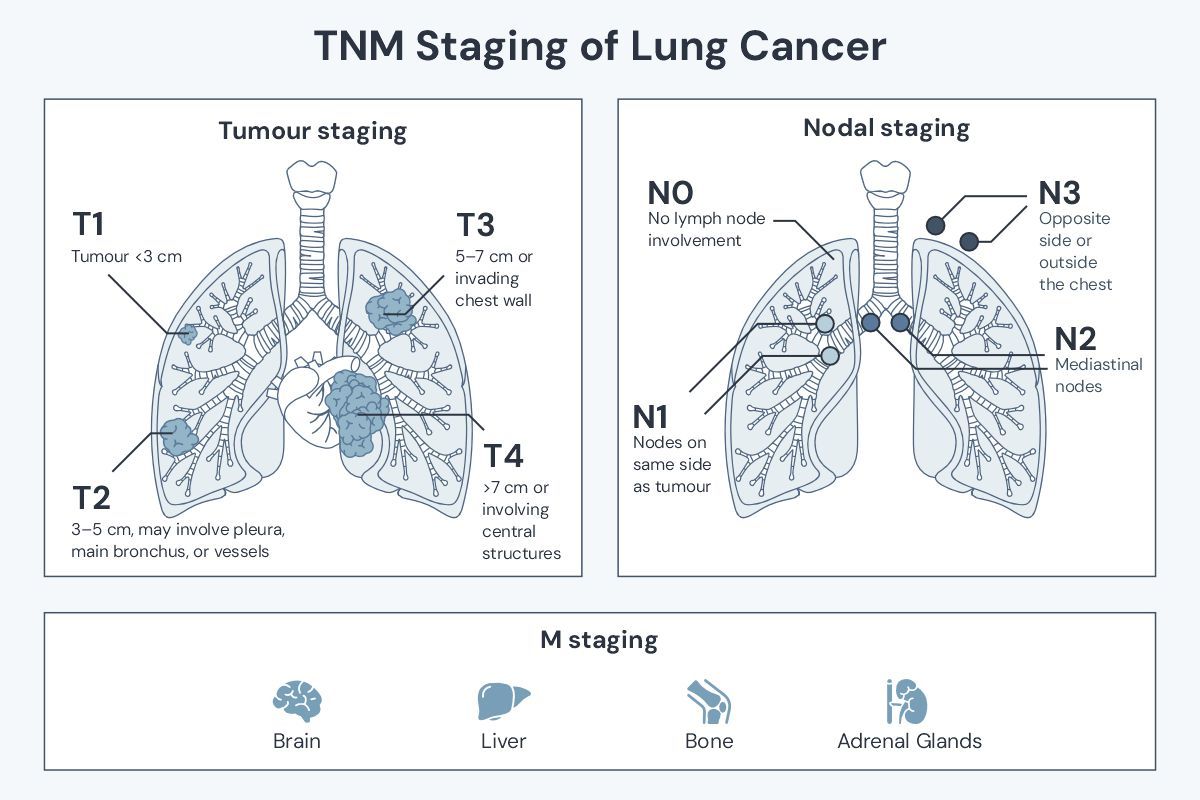Locally Advanced Lung Cancer: Stage III Care with Dr Wilson
Discover locally advanced lung cancer (Stage III), its treatments, and support. Dr. Wilson offers advanced care in London. Contact us for expert guidance.


Jump to:
- Locally Advanced Lung Cancer: Stage III Care in London
- Understanding Locally Advanced Lung Cancer
- Defining Stage III Lung Cancer
- How It Differs from Early and Metastatic Stages
- Symptoms and Diagnosis
- Key Signs of Stage III Lung Cancer
- Diagnostic Tests and Procedures
- Treatment Options for Locally Advanced Lung Cancer
- Chemoradiotherapy: Combining Treatments
- Immunotherapy: Boosting Your Immune System
- Stereotactic Radiotherapy: Precision Targeting
- Proton Beam Therapy: Advanced Radiation
- Targeted Therapies: Personalised Options
- Surgery: When It’s an Option
- Dr. James Wilson: Leading Lung Cancer Specialist
- Expertise and Credentials
- Access to Cutting-Edge Technologies
- Multidisciplinary Treatment Plans
- Supporting You Emotionally and Practically
- Patient Stories and Support
- UK-Wide Virtual Consultations
- Prognosis and Hope
- Factors Shaping Your Outcome
- Advances Improving Survival Rates
- Living with Locally Advanced Lung Cancer
- UK Support Resources
- NHS and Private Care Options
- Connecting with Support Groups
- Research and Future Directions
- Breakthroughs in Stage III Treatment
- UK-Based Clinical Trials
- Frequently Asked Questions
- What treatments are best for stage III lung cancer?
- How does Dr. Wilson personalise care?
- What is the role of immunotherapy in stage III?
- Can I access proton beam therapy through Dr. Wilson?
- Connect with Dr. James Wilson
- Schedule Your Consultation
- London Clinic Locations
Locally Advanced Lung Cancer: Stage III Care in London
Understanding Locally Advanced Lung Cancer
Defining Stage III Lung Cancer
Locally advanced lung cancer refers to stage III disease in the TNM staging system, where cancer has spread within the chest but has not reached distant organs. Stage III is often divided into stage IIIA, stage IIIB, and stage IIIC, based on the tumour’s size, lymph node involvement, and location.
Stage IIIA, for example, may involve cancer spread to nearby lymph nodes on the same side of the chest as the primary tumour, while IIIB and IIIC typically indicate more extensive lymph node involvement or tumour invasion of nearby structures like the chest wall or major blood vessels. These classifications are vital for determining the most appropriate treatment plan for NSCLC patients.
For more information on lung cancer staging, read my comprehensive guide on lung cancer here.
Lung cancer stage and TNM classification:

How It Differs from Early and Metastatic Stages
Early-stage lung cancer is often confined to a small area and can sometimes be treated with surgery or stereotactic radiotherapy. In contrast, stage IV metastatic lung cancer means the disease has spread to distant parts of the body, such as the brain, liver, or bones. Locally advanced lung cancer lies in between—more complex than early-stage but potentially treatable with curative intent.
Many patients in my clinic with Stage III NSCLC have gone on to experience long-term survival.
Symptoms and Diagnosis
Key Signs of Stage III Lung Cancer
Symptoms of locally advanced non-small cell lung cancer (LA-NSCLC) can include:
-
Persistent cough or a change in a long-standing cough
-
Shortness of breath
-
Chest pain
-
Weight loss
-
Fatigue
-
Repeated chest infections
-
Coughing up blood
Because symptoms often overlap with other conditions, early and accurate diagnosis is essential.
There are a number of types of NSCLC. The most common types are adenocarcinoma and squamous cell carcinoma.
Diagnostic Tests and Procedures
Diagnosis usually involves a combination of imaging and biopsy:
-
CT scans, computed tomography, and magnetic resonance imaging (MRI)
-
Chest X-ray
-
Positron Emission Tomography (PET)
-
Bronchoscopy and endobronchial ultrasound to biopsy lymph nodes
-
Blood tests to assess general health
These help determine the disease stage, lymph node involvement, and overall suitability for systemic treatment, concurrent chemoradiotherapy, or local therapy.
Treatment Options for Locally Advanced Lung Cancer
Treating stage III NSCLC typically involves modality therapy — a combination of therapies — tailored to the individual patient based on factors such as tumour size, target volume, lymph node involvement, performance status, and overall health.
Your lung cancer treatment will be personalised to your unique situation. There have been tremendous developments in recent years in terms of treatment options and outcomes.
Chemoradiotherapy: Combining Treatments
The international standard of care for many patients with unresectable non-small cell lung cancer is concurrent chemoradiotherapy. This involves giving chemotherapy and thoracic radiation at the same time. Chemotherapy regimens vary and will be tailored to your cancer type.
Evidence from randomised phase III studies, prospective studies, and systematic reviews shows that concurrent chemoradiation improves local control, progression-free survival, and overall survival, especially in fit patients with good performance status. Key publications in N Engl J Med, Ann Oncol, and J Natl Cancer Inst support this approach.
Immunotherapy: Boosting Your Immune System
Recent advances have introduced immune checkpoint inhibitors (e.g., durvalumab) as consolidation therapy following chemoradiotherapy. Studies, such as the PACIFIC trial, demonstrate improved median OS, long-term outcomes, and disease control with this approach. It is becoming an essential part of effective lung cancer treatment.
Stereotactic Radiotherapy: Precision Targeting
While SABR (stereotactic ablative radiotherapy) is not standard for stage III, it may be considered for oligoprogressive disease in selected cases. It's more commonly used in early-stage or medically inoperable cases.
Proton Beam Therapy: Advanced Radiation
Proton beam therapy is a highly advanced radiation treatment, using high-energy protons to deliver a high-dose to the target volume with reduced exposure to surrounding healthy tissues.
Dr James Wilson offers proton beam therapy for lung cancer at Proton International London. This approach is ideal for unresectable NSCLC, locally advanced stage III tumours near sensitive areas like the spinal cord, heart, or oesophagus.
Benefits include:
-
Superior dose distribution and pencil beam scanning
-
Less exit dose and reduced damage to healthy lung
-
Potential for dose escalation
-
Improved treatment tolerance and fewer side effects
Targeted Therapies: Personalised Options
For NSCLC patients with mutations such as epidermal growth factor receptor (EGFR), tyrosine kinase inhibitors may be used as part of a systemic therapy plan. These treatments are informed by Clinical Practice guidelines and open access molecular testing.
TKIs are offered to selected patients after the operation to reduce the likelihood of recurrence (e.g. the development on metastatic non small cell lung cancer).
Surgery: When It’s an Option
In select stage IIIA patients with good performance status, neoadjuvant chemotherapy or chemoradiotherapy may make surgical resection possible. These cases are handled by expert Thoracic Surgeons in collaboration with Dr Wilson.
The need for adjuvant treatment, including postoperative radiotherapy will be decided on the histology of the resected primary tumour and nodes. Postoperative radiotherapy is rarely needed after a complete resection.
Increasingly we are offering Stage III lung cancer patients perioperative immunotherapy - neoadjuvant treatment (chemoimmunotherapy before the operation) followed by adjuvant immunotherapy after the operation.
Dr. James Wilson: Leading Lung Cancer Specialist
Expertise and Credentials
Dr James Wilson is a Consultant Clinical Oncologist with a DPhil from Oxford, trained at Royal Marsden and Massachusetts General Hospital, and active in both Medical Oncology and Radiation Oncology. He specialises in locally advanced lung cancer and Stage III NSCLC management.
Access to Cutting-Edge Technologies
Dr Wilson provides:
-
Proton beam therapy for locally-advanced lung cancer at Proton International London
-
Access to clinical trials for unresectable non-small cell lung cancer
-
Use of state-of-the-art imaging including computed tomography and MRI
Multidisciplinary Treatment Plans
He collaborates with:
-
Thoracic Surgery teams
-
Medical oncologists
-
Respiratory physicians
-
Clinical nurse specialists
Every treatment plan is tailored for better outcome, considering the patient's disease stage and risk factors.
Supporting You Emotionally and Practically
Patient Stories and Support
Patients benefit from Dr Wilson’s clear communication and compassionate care throughout diagnosis, treatment, and follow-up. His team supports patients with resources to navigate the challenges of advanced cancer.
UK-Wide Virtual Consultations
Remote consultations are available to support decision-making, discuss treatment options, or provide a second opinion. Should you decide to travel to London for treatment, we can support you with some of the practicalities. We can also discuss options for Dr Wilson supervising your treatment closer to your home.
Prognosis and Hope
Factors Shaping Your Outcome
Prognosis for locally advanced disease is influenced by:
-
Lymph node spread
-
Tumour response to therapy
-
Genetic mutations
-
Systemic treatment approach
Advances Improving Survival Rates
Advances in consolidation therapy, proton beam radiotherapy, and integration of immunotherapy improve 5-year survival rates. Median survival continues to rise in select patient groups.
Living with Locally Advanced Lung Cancer
Long-term support helps patients manage:
-
Physical symptoms
-
Nutritional needs
-
Emotional and psychological wellbeing
Follow-up care includes routine CT scans, surveillance of cancer cells, and managing adverse events. Dr Wilson supports patients with regular reviews and adjustments to their plan as needed.
Scans in follow-up aim to confirm long-term control of the primary tumour as well as detecting a distant metastasis early should it develop. This gives the best chance at offering proactive treatment for any recurrence. While Stage III NSCLC can be considered to be high risk, regular follow-up appointments and scans will detect and changes early to allow active treatment.
UK Support Resources
NHS and Private Care Options
Private care enables:
-
Faster access to diagnostics like chest X-ray and PET-CT
-
Rapid initiation of therapy
-
Coordination with leading Cancer Centres and seamless integration with your NHS team
Connecting with Support Groups
National support includes:
-
National Cancer Institute
-
Macmillan Cancer Support
-
Lung Cancer Support Group UK
Research and Future Directions
Breakthroughs in Stage III Treatment
Ongoing prospective trials and clinical studies explore combinations of sequential chemoradiation, immunotherapy, and novel systemic therapies. Journals like Ann Oncol, Ann Thorac Surg, and J Natl Cancer Inst offer updated insights.
UK-Based Clinical Trials
Dr Wilson offers access to trials through open access platforms.
Frequently Asked Questions
What treatments are best for stage III lung cancer?
Treatment usually involves concurrent chemoradiotherapy followed by immunotherapy. In some cases, surgery, proton therapy, or targeted drugs are added.
How does Dr. Wilson personalise care?
Each plan is built on computed tomography, magnetic resonance, pathology, and mutation status. This ensures the best fit for each individual patient.
What is the role of immunotherapy in stage III?
Immunotherapy helps the immune system destroy residual cancer cells, improving disease-free survival and reducing disease progression.
Can I access proton beam therapy through Dr. Wilson?
Yes. Dr Wilson provides proton beam therapy for non small cell lung cancer at Proton International London, tailored to your needs. Careful patient selection is essential to ensure PBT is offered to you if it is thought to be of benefit.
Connect with Dr. James Wilson
Schedule Your Consultation
-
Phone: +44 (0)20 7993 6716
-
Email: info@drjameswilson.co.uk
-
Contact form here
-
Professional referrals - click here
London Clinic Locations
Dr Wilson sees patients at:
-
The Cromwell Hospital
-
The London Clinic
-
LOC Harley Street
-
LOC Sydney Street
-
Proton International London
Start your journey to personalised lung cancer care today.